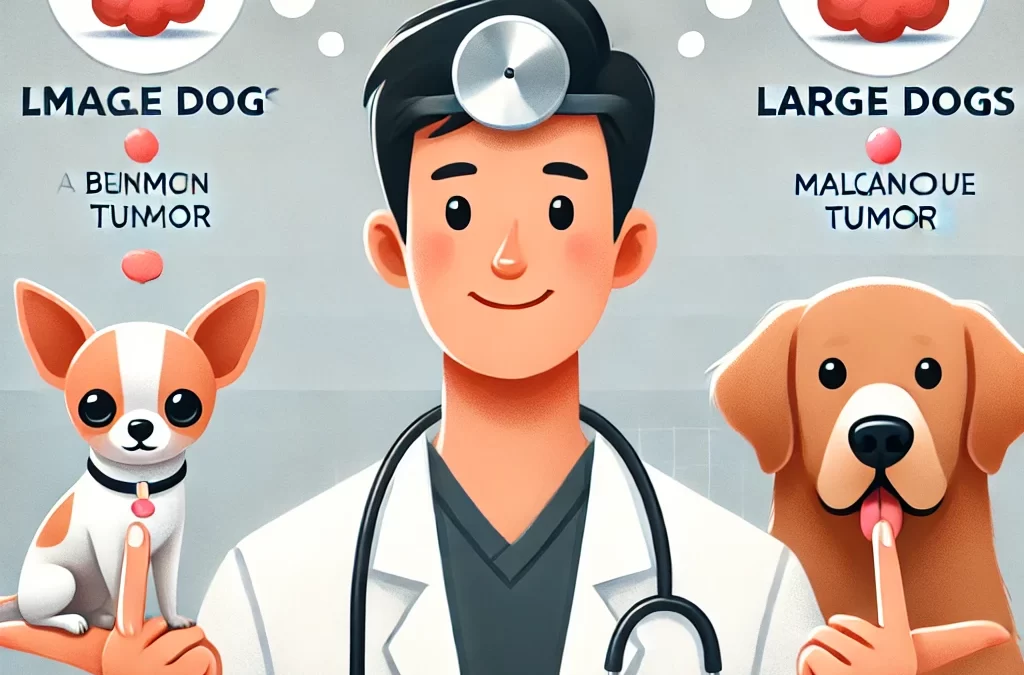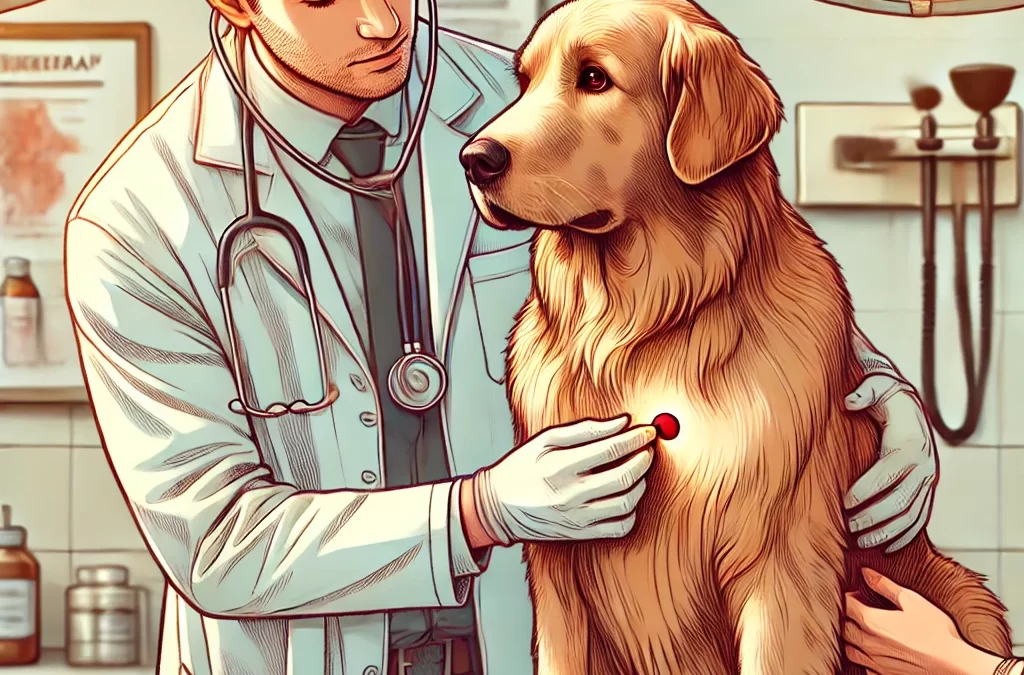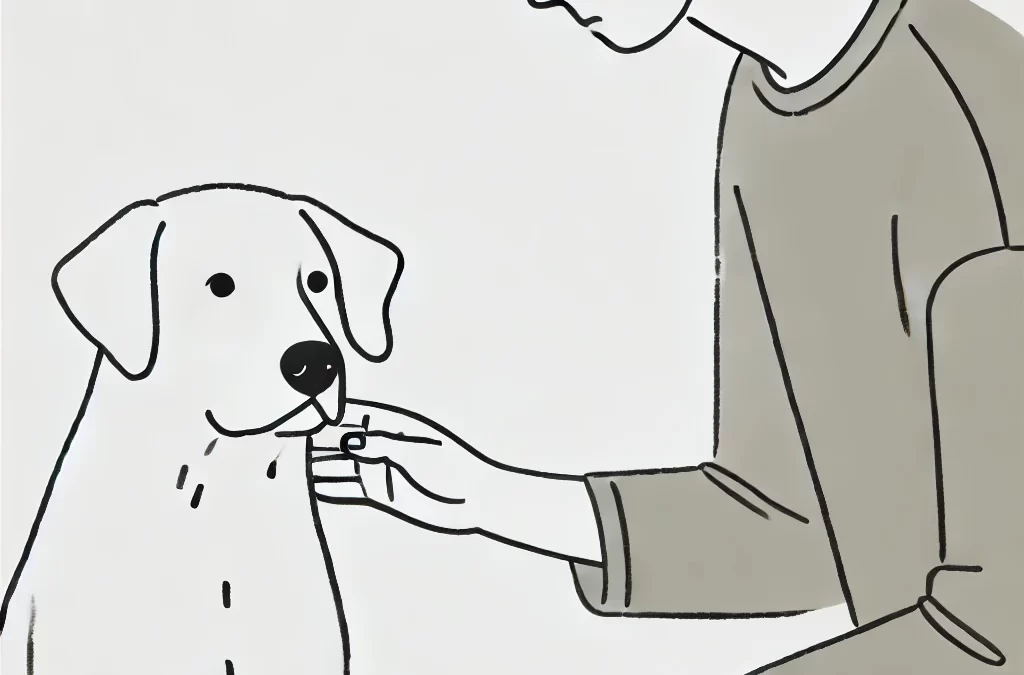
door TCMVET | 21 januari 2025 | Hondenkanker en tumoren
Het is een emotionele en hartverscheurende reis om een geliefde hond te zien vechten tegen kanker in een vergevorderd stadium. Hoewel een genezing misschien niet mogelijk is, zijn er manieren om hun comfort te vergroten, pijn te verlichten en hun resterende kwaliteit van leven te verbeteren. Dit artikel onderzoekt praktische, meelevende en zelfs alternatieve benaderingen om honden met terminale kanker te ondersteunen.
1. Prioriteit geven aan pijnbestrijding
Pijnbestrijding is de hoeksteen van de zorg voor kanker in een laat stadium. Conventionele opties voor pijnbestrijding omvatten:
- Voorgeschreven pijnstillers – NSAID’s (niet-steroïde anti-inflammatoire geneesmiddelen) en opioïden (zoals tramadol) helpen pijn effectief te beheersen.
- Aanvullende therapieën – Gabapentine bij zenuwpijn en amantadine als NMDA-antagonist kunnen het comfort verbeteren in combinatie met andere pijnstillers.
- CBD-olie en kruidenremedies – Veel huisdiereigenaren gebruiken CBD-olie met een volledig spectrum, kurkuma en boswellia om ontstekingen en pijn op natuurlijke wijze te verminderen.
2. Voedingsondersteuning om de vitaliteit te versterken
Een dieet dat is afgestemd op kankerondersteuning kan de progressie vertragen en het algehele welzijn verbeteren. Denk aan:
- Hoogwaardige eiwitten – Mager vlees en vis leveren essentiële aminozuren voor het behoud van spieren.
- Gezonde vetten – Omega-3-vetzuren uit visolie helpen ontstekingen te verminderen en kunnen de groei van tumoren vertragen.
- Koolhydraatarm, vezelrijk dieet – Kankercellen gedijen goed op suiker, dus het verminderen van de inname van koolhydraten kan de progressie ervan vertragen.
- Natuurlijke supplementen – Medicinale paddenstoelen zoals kalkoenstaart en reishi, samen met Chinese kruiden zoals astragalus, kunnen het immuunsysteem ondersteunen.
3. Holistische therapieën voor comfort en mobiliteit
Naast medicijnen en dieet kunnen holistische behandelingen extra verlichting bieden:
- Acupunctuur – Helpt pijn te verminderen, de mobiliteit te verbeteren en de energiebalans te stimuleren.
- Massage therapie – Een zachte massage verbetert de bloedsomloop en verlicht stijfheid.
- Hydrotherapie – Warmwatertherapie verlicht de druk op de gewrichten en bevordert zachte oefeningen.
- Energiegenezing en Reiki – Sommige huisdiereigenaren onderzoeken energiegenezing voor ontspanning en stressverlichting.
4. Een comfortabele omgeving creëren
Het aanpassen van de leefruimte van uw hond kan een groot verschil maken:
- Zacht beddengoed en orthopedische ondersteuning – Bedden van traagschuim verminderen doorligwonden en gewrichtspijn.
- Temperatuurregeling – Oudere, zieke honden hebben moeite met het reguleren van hun temperatuur. Daarom is het belangrijk om ze in de winter warm en in de zomer koel te houden.
- Stress minimaliseren – Een rustige, kalme omgeving met vertrouwde geuren kan helpen angst en pijn te verlichten.
5. Omgaan met spijsverteringsproblemen en hydratatie
Kanker kan leiden tot misselijkheid, diarree en verlies van eetlust. Het aanpakken van deze symptomen helpt het welzijn te verbeteren:
- Appetite Stimulants – Medicijnen zoals mirtazapine kunnen het eten stimuleren.
- Zelfgemaakte bottenbouillon – Zacht voor de maag, boordevol voedingsstoffen en hydraterend.
- Probiotica en spijsverteringsenzymen – Ondersteunt de gezondheid van de darmen en helpt bij de spijsvertering.
- Regelmatige hydratatie – Zorg voor voldoende waterinname om uitdroging te voorkomen en de nierfunctie te ondersteunen.
6. Emotionele steun en hechtingsmomenten
Jouw aanwezigheid is een van de grootste troost voor een hond in zijn laatste levensfase. Breng tijd samen door:
- Doe mee aan favoriete activiteiten – Een korte wandeling, een autorit of een rustige knuffelsessie kan vreugde brengen.
- Praat met je hond – Het geluid van uw stem is geruststellend en kalmerend.
- Wees aanwezig zonder angst – Honden voelen emoties aan, dus het behouden van een vredige en liefdevolle energie helpt hen zich veilig te voelen.
7. Weten wanneer je afscheid moet nemen
Een van de moeilijkste beslissingen is om te bepalen wanneer euthanasie de meest meelevende keuze is. Denk aan:
- De HHHHHMM-schaal – Deze kwaliteitsbeoordeling van leven, ontwikkeld door Dr. Alice Villalobos, meet pijn, honger, hydratatie, hygiëne, geluk, mobiliteit en meer goede dan slechte dagen.
- Veterinaire hospice en euthanasie aan huis – Veel dierenartsen bieden diensten aan huis aan, zodat de overgang in een vertrouwde omgeving rustig kan verlopen.
- Luisteren naar je hond – Gedragsveranderingen, aanhoudende pijn ondanks medicatie of een volledig verlies van eetlust kunnen erop wijzen dat het tijd is.
Conclusie
Zorgen voor een hond met kanker in een vergevorderd stadium is een diepgaande ervaring vol liefde, toewijding en medeleven. Door te focussen op pijnbestrijding, nutritionele ondersteuning, holistische therapieën en emotioneel welzijn, kunnen huisdiereigenaren ervoor zorgen dat de resterende dagen van hun hond gevuld zijn met comfort en waardigheid. Of ze nu kiezen voor palliatieve zorg of uiteindelijk de moeilijke beslissing nemen om afscheid te nemen, het doel blijft hetzelfde: de band eren en ze de best mogelijke levenskwaliteit geven.

door TCMVET | 20 januari 2025 | Hondenkanker en tumoren
Als het gaat om kanker en tumorontwikkeling bij honden, is grootte van belang, letterlijk. Kleine en grote rassen hebben verschillende genetische aanleg, stofwisselingssnelheden en immuunreacties, die allemaal bijdragen aan variaties in hoe tumoren zich ontwikkelen, vorderen en reageren op behandeling. Als u een huisdiereigenaar bent die zich zorgen maakt over de gezondheid van uw hond, kan het begrijpen van deze verschillen u helpen om weloverwogen beslissingen te nemen over preventie, vroege detectie en behandeling.
1. De genetische factor: rasspecifieke tumorrisico's
Sommige vormen van kanker komen vaker voor bij bepaalde rassen, en de grootte van de hond speelt vaak een rol bij deze aanleg.
- Grote rassen: Honden zoals Golden Retrievers, Duitse Doggen en Rottweilers hebben meer kans om osteosarcoom (botkanker), hemangiosarcoom (bloedvatkanker) en lymfoomDeze kankers zijn vaak agressief en zaaien snel uit.
- Kleine rassen: Rassen zoals poedels, teckels en chihuahua's zijn gevoeliger voor goedaardige tumoren zoals lipomen en papillomen, maar ze kunnen zich ook ontwikkelen borsttumoren en blaaskanker.
Het verschil zit niet alleen in het type tumor, maar ook in de manier waarop de kankersoorten zich gedragen en reageren op de behandeling.
2. Groeisnelheid en gedrag van tumoren
De tumorontwikkeling verschilt aanzienlijk tussen kleine en grote honden, vanwege verschillen in groeisnelheid en celmetabolisme.
- Snellere groei bij grote honden:Grotere rassen groeien snel als puppy's, en deze snelle celdeling kan bijdragen aan een hoger risico op het ontwikkelen van kwaadaardige tumoren later in hun leven. Hun tumoren zijn ook agressiever.
- Langzamere groei bij kleine honden:Hoewel tumoren zich bij kleine rassen langzamer ontwikkelen, vormen ze nog steeds een reden tot zorg. Goedaardige tumoren zoals lipomen komen vaak voor, maar kunnen de mobiliteit belemmeren als ze te groot worden. Bovendien kunnen kleine honden nog steeds kwaadaardige tumoren ontwikkelen, zoals mestceltumoren, die zich kan verspreiden als ze niet wordt behandeld.
3. Levensverwachting en tumorontwikkeling
Grote honden leven doorgaans korter dan kleine honden, wat invloed heeft op de snelheid waarmee tumoren zich ontwikkelen.
- Vroegtijdige kankers bij grote honden:Omdat grote rassen sneller verouderen, is de kans groter dat ze op jongere leeftijd kanker krijgen, vaak tussen 6 tot 8 jaar oudDit betekent dat eigenaren al vroeg met kankeronderzoek en preventieve zorg moeten beginnen.
- Later ontstane tumoren bij kleine honden:Bij kleine rassen kunnen pas tekenen van kanker optreden als ze seniorenjaren (10+ jaar oud), wat betekent dat langdurige monitoring essentieel is.
Als huisdiereigenaren deze tijdlijnen begrijpen, kunnen ze op het juiste moment een afspraak bij de dierenarts inplannen, zodat ze mogelijke tumoren vroegtijdig kunnen opsporen.
4. Diagnose- en behandelingsuitdagingen
Bij het diagnosticeren en behandelen van tumoren speelt de grootte een rol bij zowel de detectie als het vermogen om procedures uit te voeren.
- Chirurgische overwegingen: Grote honden kunnen sommige operaties beter verdragen vanwege hun grotere lichaamsmassa, maar het verwijderen van tumoren in gewichtdragende botten (zoals bij osteosarcoom) kan een uitdaging zijn. Kleine honden kunnen daarentegen moeite hebben met anesthesierisico's, vooral als ze erg klein zijn.
- Verschillen tussen chemotherapie en medicatie: De dosering voor chemotherapie is afhankelijk van het gewicht en grotere honden hebben vaak hogere medicijndoses, waardoor de behandelingskosten stijgen. Kleine honden kunnen, ondanks dat ze lagere doses nodig hebben, sterkere bijwerkingen ervaren vanwege hun delicate systemen.
5. Preventie- en vroege detectiestrategieën
Ongeacht de grootte is vroege detectie cruciaal. Dit is wat hondenbezitters kunnen doen:
- Routinematige veterinaire controlesRegelmatige onderzoeken helpen tumoren op te sporen voordat ze te groot worden.
- Fysieke controles thuisDoor wekelijks met uw handen over het lichaam van uw hond te gaan, kunt u ongebruikelijke bulten ontdekken.
- Ras-specifieke kankerscreenings: Bij grote rassen is het verstandig om in een vroeg stadium röntgenfoto's en echo's te laten maken, terwijl bij kleine rassen huid- en blaasonderzoeken nuttig kunnen zijn.
- Dieet- en levensstijlaanpassingen:Een evenwichtig dieet, regelmatige lichaamsbeweging en gewichtsbeheersing kunnen de algemene gezondheid ondersteunen en mogelijk het risico op kanker verminderen.
Laatste gedachten
Hoewel tumoren zowel kleine als grote honden treffen, betekenen hun verschillen in genetica, tumorgedrag en behandelingsopties dat huisdiereigenaren op maat gemaakte zorgstrategieën nodig hebben. Grote honden zijn vatbaarder voor agressieve kankers op jongere leeftijd, terwijl kleine honden later in hun leven langzamer groeiende tumoren kunnen ontwikkelen. Door deze verschillen te begrijpen en prioriteit te geven aan vroege detectie, kunnen hondeneigenaren de kwaliteit van leven van hun huisdieren verbeteren en mogelijk hun tijd samen verlengen.

door TCMVET | 20 januari 2025 | Hondenkanker en tumoren
Stel je voor: je hebt je hond net een welverdiende buikwrijving gegeven na een leuke wandeling. Opeens strijken je vingertoppen langs een klein bultje dat je nog nooit eerder hebt opgemerkt. Zet de spannende muziek aan: heeft een buitenaardse indringer (lees: kwaadaardige tumor) zijn kamp opgeslagen, of is het gewoon een onschuldige kraker (goedaardige groei) die onder de huid van je hond ligt? Voordat je alarm slaat of het wegwuift, laten we wat licht werpen op hoe je deze mysterieuze nieuwe bewoners in het lichaam van je harige vriend kunt ontcijferen.
1. “Growth CSI”: Forensische aanwijzingen die ertoe doen
Stel je voor dat je de detective bent in een misdaaddrama met hoge inzetten. Jouw taak is om al het bewijs te verzamelen:
- Textuur en mobiliteitKwaadaardige tumoren voelen vaak onregelmatig aan en kunnen zich vasthechten aan omringend weefsel, terwijl goedaardige knobbels doorgaans gladder en beweeglijker zijn.
- Groeitempo: Is die bult snel aan het opzwellen als een ballon, of is hij al weken of maanden even groot? Snellere groei kan wijzen op kwaadaardigheid.
- Geassocieerde symptomen: Veranderingen in eetlust, lusteloosheid, gewichtsverlies of plaatselijke pijn kunnen extra waarschuwingssignalen zijn die onmiddellijke aandacht vereisen.
De belangrijkste conclusie? Trek geen conclusies alleen op basis van hoe de bult aanvoelt. Maar houd je 'detective notebook' wel up-to-date met observaties.
2. Wetenschappelijke intel: diagnostische tests onthullen de waarheid
Net als bij elke goede thriller heb je een gekwalificeerde partner nodig om de zaak te kraken. In deze aflevering is dat je vertrouwde dierenarts, gewapend met hightech-tools en een scherp oog voor detail:
- Fijne naaldaspiratie (FNA): Een snelle, minimaal invasieve test die onmiddellijke cellulaire aanwijzingen kan geven. Zie het als het verzamelen van "vingerafdrukken" van de identiteit van de knobbel.
- Biopsie: Soms is een nadere blik nodig, zoals het analyseren van het DNA van een verdachte. Een biopsie biedt een diepere duik in de structuur en het celgedrag van het weefsel.
- Beeldvormingshulpmiddelen:Röntgenfoto's, echo's en MRI-scans fungeren als het vergrootglas van de detective. Ze brengen verborgen aanwijzingen over de grenzen van de groei en de mogelijke verspreiding ervan aan het licht.
3. Tumor of goedaardige groei? Het vonnis begrijpen
Na het verzamelen van bewijs en het uitvoeren van tests, zal het vonnis vallen. Kwaadaardige tumoren - onze "buitenaardse indringers" - brengen het risico van infiltratie en metastasering met zich mee. Dit vereist vaak een snelle, soms agressieve, behandeling, die chirurgie, chemotherapie of bestraling kan omvatten. Goedaardige gezwellen - onze "onschadelijke kraakbeencellen" - groeien over het algemeen langzaam en blijven beperkt, maar dat betekent niet dat u ze altijd kunt negeren. Sommige goedaardige massa's kunnen nog steeds op vitale organen drukken of na verloop van tijd zweren, waardoor verwijdering of periodieke controle noodzakelijk is.
4. Een behandelplan opstellen
Of de diagnose nu een ongevaarlijke kraker is of een bevestigde buitenaardse indringer, het hebben van een solide plan is ononderhandelbaar:
- Chirurgisch verwijderen: Vaak de eerste verdedigingslinie, zoals het uitzetten van een slechte huurder.
- Medicijnen en therapieënChemotherapie, doelgerichte therapie of immunotherapie kunnen de doorslag geven in het voordeel van uw hond als de tumor kwaadaardig is.
- Aanpassingen van levensstijl:Van speciale diëten tot rustige trainingsroutines: holistische ondersteuning zorgt ervoor dat uw hond zich optimaal voelt tijdens de behandeling.
- Voortdurende monitoring: Zie dit als een soort omtrekpatrouille om ervoor te zorgen dat er geen verdachte plekken meer voorkomen of ergens anders opduiken.
5. Vier de overwinningen en deel de reis
Het vinden van een nieuwe bult kan een angstaanjagende wending zijn in het verhaal van uw geliefde huisdier. Maar onthoud: niet elke bult is een doemscenario. Gewapend met waakzaamheid en een proactieve aanpak kunt u dit mysterie van "alien vs. squatter" omzetten in een beheersbare subplot in het levensavontuur van uw hond. Deel updates met uw dierenarts, vier kleine overwinningen (een stabiele bult, een succesvolle operatie, een goed energieniveau) en koester elke kwispeling onderweg.
Want uiteindelijk eindigt elk detectiveverhaal dat de moeite waard is om te vertellen, met hoop - en misschien een paar extraatjes voor de beste maatje ter wereld: uw hond.

door TCMVET | 18 jan. 2025 | Hondenkanker en tumoren
Kanker bij honden is een enorme uitdaging, die vaak te laat wordt gediagnosticeerd voor effectieve interventie. Traditionele diagnostische hulpmiddelen zoals biopsieën en beeldvorming hebben hun beperkingen: ze kunnen invasief, kostbaar of niet in staat zijn om tumoren in een vroeg stadium te detecteren. Maak kennis met tumorbiomarkers: moleculaire signaturen die in bloed, urine of weefsel worden aangetroffen en die een baanbrekende aanpak bieden voor oncologie bij honden. Met vooruitgang in de diergeneeskunde die parallel loopt met doorbraken in de humane oncologie, is de race gaande om betrouwbare, niet-invasieve biomarkers te ontwikkelen voor vroege detectie, realtime monitoring en gepersonaliseerde behandelingsstrategieën.
1. Wat zijn tumorbiomarkers en waarom zijn ze belangrijk?
Tumorbiomarkers zijn meetbare biologische stoffen die de aanwezigheid, progressie of respons op de behandeling van kanker aangeven. Deze kunnen zijn:
- Eiwitten en enzymenVerhoogde niveaus van specifieke eiwitten, zoals C-reactief proteïne (CRP) of thymidine kinase 1 (TK1), kunnen wijzen op maligniteiten.
- Circulerend tumor-DNA (ctDNA):Fragmenten van tumor-DNA die in de bloedbaan worden aangetroffen, bieden inzicht in genetische mutaties en de tumorbelasting.
- Exosomen en microRNA's (miRNA's):Kleine extracellulaire blaasjes en niet-coderende RNA's blijken veelbelovende hulpmiddelen te zijn voor de detectie en prognose van kanker.
Als kanker kan worden opgespoord voordat deze klinisch zichtbaar is, kan dat de behandelresultaten en de kwaliteit van leven van honden drastisch verbeteren.
2. De biomarkerrevolutie: van concept tot klinische toepassing
2.1. Vroegtijdige detectie: de ultieme game-changer
Kanker in een vroeg stadium is vaak asymptomatisch, waardoor routinematige screening een uitdaging is. Biomarkers kunnen deze kloof dichten door maligniteiten te identificeren lang voordat symptomen zich voordoen.
- Hondenspecifieke CRP en TK1: Verhoogde niveaus worden in verband gebracht met lymfoom, hemangiosarcoom en mestceltumoren.
- Serum microRNA'sBepaalde miRNA-profielen correleren sterk met osteosarcoom en borsttumoren, waardoor routinematige bloedtesten de mogelijkheid bieden om gevallen met een hoog risico op te sporen.
2.2. Prognostische inzichten: uitkomsten met precisie voorspellen
Niet alle tumoren gedragen zich op dezelfde manier. Biomarkers helpen dierenartsen onderscheid te maken tussen agressieve kankers en langzaam groeiende neoplasmata, wat op maat gemaakte behandelstrategieën mogelijk maakt.
- Ki-67 en PCNA (proliferatiemarkers): Hoge expressieniveaus duiden op een snelle tumorgroei en een slechtere prognose.
- LDH (Lactaat Dehydrogenase): Verhoogde LDH-waarden duiden vaak op metastasen bij hemangiosarcoom en zijn bepalend voor de intensiteit van de behandeling.
2.3. Therapeutische monitoring: realtime behandelingsaanpassingen
Biomarkers maken het mogelijk om de tumorrespons niet-invasief te volgen, waardoor dierenartsen behandelingen dynamisch kunnen aanpassen.
- Circulerend tumor-DNA (ctDNA):Door het ctDNA-niveau te controleren, kan worden bepaald hoe goed een hond reageert op chemotherapie of bestraling.
- Exosomenprofielering: Veranderingen in de samenstelling van de exosomale vracht na de behandeling geven aanwijzingen over resterende ziekte en het risico op terugval.
3. Geavanceerde technologieën vormen de toekomst van oncologie bij honden
3.1. Kunstmatige intelligentie (AI) ontmoet biomarkers
AI-gestuurde diagnostische tools worden nu getraind om biomarkerpatronen te analyseren, wat bijna onmiddellijke, zeer nauwkeurige beoordelingen oplevert. Stel je een AI-gestuurde bloedtest voor die het risico op kanker voorspelt voordat klinische tekenen zich voordoen!
3.2. Vloeibare biopsie: het einde van invasieve diagnostiek?
Vloeibare biopsie, die ctDNA en exosomale markers detecteert, staat op het punt om kankerdiagnostiek te revolutioneren. In tegenstelling tot traditionele biopsieën biedt het een minimaal invasieve, realtime momentopname van tumorontwikkeling.
3.3. Gepersonaliseerde medicijnen voor honden
Naarmate het onderzoek naar biomarkers vordert, kunnen dierenartsen binnenkort wellicht beslissingen nemen op basis van biomarkers. Zo kunnen ze de beste chemotherapie, immunotherapie of gerichte behandelingen selecteren op basis van het unieke tumorprofiel van een hond.
4. Uitdagingen en ethische overwegingen
Ondanks de beloften kent biomarker-gebaseerde diagnostiek nog een aantal obstakels:
- Standaardisatieproblemen: Biomarkerniveaus kunnen variëren afhankelijk van ras, leeftijd en gelijktijdig optredende ziekten.
- Kosten versus toegankelijkheidGeavanceerde biomarkertests zijn nog steeds duur en niet algemeen beschikbaar.
- Vals-positieve en -negatieve resultaten: Geen enkele biomarkertest is waterdicht volgens de 100%-methode. Er is verdere verfijning nodig om de betrouwbaarheid te garanderen.
5. Conclusie: Het begin van een nieuw tijdperk in de zorg voor hondenkanker
Tumorbiomarkers zijn niet langer alleen theoretische hulpmiddelen: ze worden snel integraal onderdeel van de diagnose, prognose en behandeling van kanker bij honden. Door deze moleculaire revolutie te omarmen, stapt de diergeneeskunde een toekomst binnen waarin kanker eerder wordt ontdekt, nauwkeuriger wordt behandeld en met ongekende nauwkeurigheid wordt gemonitord.
Naarmate de technologie zich ontwikkelt, kan de droom van een eenvoudige bloedtest die meerdere vormen van kanker bij honden opspoort, binnenkort werkelijkheid worden. Hierdoor krijgen honden en hun baasjes het kostbare geschenk van meer tijd en een betere kwaliteit van leven.

door TCMVET | 18 jan. 2025 | Hondenkanker en tumoren
De wereld van veterinaire oncologie is getuige van een dramatische verschuiving nu geavanceerde technologie en visionair onderzoek samenkomen om onze benadering van hersentumoren bij honden te transformeren. Hoewel conventionele diagnostische methoden en traditionele behandelingsmodaliteiten al lang de leidraad zijn voor artsen, belooft een nieuw tijdperk van innovatie klinische uitkomsten opnieuw te definiëren en ons begrip van deze complexe aandoeningen te verbeteren. Hieronder onderzoeken we hoe state-of-the-art diagnostische hulpmiddelen, kunstmatige intelligentie en de groeiende invloed van stereotactische radiochirurgie (SRS) de grenzen van neuro-oncologie bij honden verleggen.
- Van symptomen naar vermoeden: het veranderende diagnostische landschap
1.1. Het ongewone herkennen
Historisch gezien was het detecteren van hersentumoren bij honden afhankelijk van het herkennen van subtiele neurologische signalen, zoals aanhoudende kopkanteling, ataxie en veranderingen in gedrag of eetlust. Hoewel deze rode vlaggen cruciaal blijven, bieden geavanceerde beeldvorming en data-analyse een genuanceerder perspectief. Praktiserende artsen zijn nu beter in staat om onderscheid te maken tussen ontstekingsaandoeningen, infecties en neoplasmata dankzij beeldvorming met hoge resolutie en verfijnde diagnostische algoritmen.
1.2. De opkomst van geavanceerde beeldvorming
• High-Field MRI: wordt beschouwd als de gouden standaard voor het visualiseren van intracraniële laesies en biedt gedetailleerde beelden van zacht weefsel en laesiegrenzen. De nieuwste MRI-sequenties, waaronder functionele MRI (fMRI) en diffusie tensor imaging (DTI), kunnen dieper ingaan op tumorbiologie en microstructurele veranderingen onthullen voordat macroscopische afwijkingen verschijnen.
• Magnetic Resonance Spectroscopy (MRS): MRS biedt inzichten op moleculair niveau door metabolische veranderingen in de tumor te beoordelen. Verhoogde choline- en lactaatpieken kunnen bijvoorbeeld dienen als vroege waarschuwingssignalen van maligniteit of agressieve groei.
• AI-Assisted Image Analysis: Innovatieve algoritmen aangestuurd door kunstmatige intelligentie maken het mogelijk om tumorgroei te detecteren en te kwantificeren met opmerkelijke snelheid en nauwkeurigheid. Deze tools kunnen klinische gegevens, beeldmarkers en histopathologische bevindingen integreren om de waarschijnlijke progressie of respons van een tumor op behandeling te voorspellen.
1.3. Biopsie en verder
Hoewel beeldvormingstechnologie aanzienlijk is geëvolueerd, blijft histopathologische bevestiging een steunpilaar van definitieve diagnose. Stereotactische biopsietechnieken minimaliseren invasiviteit, verminderen complicaties en versnellen herstel. In de nabije toekomst zou vloeibare biopsie - het analyseren van circulerende tumorcellen of tumor-DNA in de bloedbaan - de noodzaak van invasieve procedures verder kunnen verminderen, wat de weg vrijmaakt voor realtime tumorbewaking en dynamische behandelingsaanpassingen.
- De kwantumsprong: stereotactische radiochirurgie
2.1. Het doorbreken van de mal van conventionele radiotherapie
Decennialang was externe bestraling de de facto-aanpak om inoperabele of chirurgisch uitdagende hersentumoren bij honden te behandelen. Hoewel het in bepaalde gevallen effectief was, waren er vaak meerdere sessies over meerdere weken nodig. Maak kennis met stereotactische radiochirurgie (SRS), een precisiegestuurde techniek die in één of slechts enkele sessies een geconcentreerde stralingsdosis aan de tumor toedient, waardoor de schade aan omliggend gezond weefsel tot een minimum wordt beperkt.
2.2. Kenmerken van SRS
• Uiterst nauwkeurig: geavanceerde beeldvorming en computergestuurde behandelplanning zorgen ervoor dat de stralingsbundel alleen op de tumor wordt gericht en omliggende structuren worden gespaard.
• Minder behandelsessies: veel SRS-protocollen voor honden vereisen minder bezoeken, waardoor de stress voor zowel het huisdier als de eigenaar wordt verminderd.
• Snelle symptoomverlichting: Hoge doses straling zorgen er vaak voor dat de tumor sneller krimpt, waardoor de symptomen sneller onder controle zijn dan bij traditionele gefractioneerde radiotherapie.
• Minimale bijwerkingen: de gerichte aanpak leidt tot minder stralingsgerelateerde complicaties, zoals huidirritatie of haaruitval.
2.3. Geavanceerde apparatuur
Dierenziekenhuizen maken steeds vaker gebruik van systemen die ooit waren voorbehouden aan de humane geneeskunde, zoals Gamma Knife en CyberKnife-eenheden. Deze apparaten vertrouwen op honderden convergerende stralingsbundels of een robotarm die in staat is om hoge doses straling vanuit meerdere hoeken af te geven, wat zorgt voor ongeëvenaarde nauwkeurigheid en controle.
2.4. Integratie van SRS met andere modaliteiten
Stereotactische radiochirurgie is niet langer een geïsoleerde procedure. Veel specialisten pleiten voor een multimodale aanpak, waarbij het volgende wordt gecombineerd:
• Chemotherapie of gerichte therapie om microscopisch kleine ziekten en uitzaaiingen op afstand aan te pakken.
• Immunotherapie om het aangeboren vermogen van het lichaam om kankercellen te detecteren en te vernietigen te verbeteren.
• Voedingsondersteuning en revalidatie om het algemene welzijn te verbeteren, het herstel te versnellen en de spiermassa te behouden.
- De weg vooruit: uitdagingen en kansen
3.1. Financiële en logistieke overwegingen
Geavanceerde technologie, zoals gespecialiseerde radiotherapiemachines, vereist aanzienlijke financiële uitgaven. Bijgevolg kunnen niet alle veterinaire centra SRS aanbieden, wat de toegankelijkheid beperkt. Naarmate de technologie zich ontwikkelt en meer klinieken geavanceerde apparatuur gebruiken, kunnen de kosten echter dalen.
3.2. Onderzoeksgrenzen verleggen
Gegevens over langetermijnuitkomsten en grootschalige klinische onderzoeken blijven relatief schaars in de diergeneeskunde. Door multidisciplinaire samenwerkingen tussen dierenartsen, oncologen, radiologen en medisch natuurkundigen te cultiveren, kan het veld robuust bewijs verzamelen over de veiligheid, werkzaamheid en optimale protocollen voor SRS bij honden.
3.3. Gepersonaliseerde geneeskunde en verder
Moleculaire profilering, genetische tests en digitale medische dossiers worden samengevoegd om een meer gepersonaliseerde medische omgeving te creëren in de veterinaire zorg. Toekomstige innovaties kunnen realtime biomarker-tracking omvatten om behandelingsstrategieën direct aan te passen, wat potentieel een revolutie teweegbrengt in de neuro-oncologie van honden op manieren die we ons vandaag de dag nauwelijks kunnen voorstellen.
- Conclusie
Het diagnosticeren en behandelen van hersentumoren bij honden is nog nooit zo geavanceerd en hoopvol geweest. De fusie van zeer nauwkeurige beeldvorming, AI-gestuurde analyses en stereotactische radiochirurgie herdefinieert wat mogelijk is in de veterinaire oncologie. Hoewel er nog steeds aanzienlijke uitdagingen zijn - van het garanderen van brede toegankelijkheid tot het verzamelen van grootschalig bewijs - wijst het collectieve momentum op een betere toekomst voor hondenpatiënten met hersentumoren.
Door deze nieuwe grenzen te omarmen, verhogen we niet alleen de standaard van zorg in de neuro-oncologie van honden, maar ook de bredere missie van de diergeneeskunde zelf: het maximaliseren van de gezondheid, het comfort en de levensduur van onze geliefde metgezellen. Nu SRS en andere baanbrekende therapieën aan populariteit winnen, wordt wat ooit een verre mogelijkheid leek, snel de nieuwe norm: honden met hersentumoren een werkelijk opmerkelijke tweede kans op leven bieden.

door TCMVET | 17 jan. 2025 | Hondenkanker en tumoren
Ontdekken dat uw hond een tumor heeft, kan stressvol zijn. Een van de eerste vragen die huisdiereigenaren stellen, is: "Hoe lang heeft mijn hond nog?" Het antwoord hangt af van verschillende factoren, waaronder het type tumor, de locatie, het stadium, de behandelingsopties en de algehele gezondheid van de hond. Als u deze elementen begrijpt, kunt u weloverwogen beslissingen nemen en de best mogelijke zorg bieden aan uw harige metgezel.
Soorten tumoren en hun invloed op de levensverwachting
Niet alle tumoren zijn levensbedreigend. Sommige zijn goedaardig en hebben mogelijk geen invloed op de levensduur van uw hond, terwijl andere kwaadaardig zijn en zich agressief kunnen verspreiden.
1. Goedaardige tumoren
Goedaardige tumoren, zoals lipomen (vetgezwellen) en talgklieradenomen, hebben doorgaans geen invloed op de levensduur van een hond, tenzij ze de beweging of orgaanfunctie verstoren. In veel gevallen kunnen honden een normaal leven leiden zonder behandeling, hoewel chirurgische verwijdering kan worden overwogen voor comfort.
2. Kwaadaardige tumoren (kankergezwellen)
Kwaadaardige tumoren vormen een ernstiger risico omdat ze omliggende weefsels kunnen binnendringen en kunnen uitzaaien naar andere organen. Veelvoorkomende kwaadaardige tumoren bij honden zijn:
- Mestceltumoren (MCT's): Kan langzaam groeien of agressief zijn. Bij vroege verwijdering blijven veel honden nog jaren leven, maar gevorderde gevallen kunnen de levensduur aanzienlijk verkorten.
- Osteosarcoom (botkanker): Zeer agressief, vaak amputatie en chemotherapie nodig. Zonder behandeling is de overlevingstijd doorgaans 3-6 maanden, maar met behandeling leven sommige honden 1-2 jaar of langer.
- lymfoom: Een van de meest voorkomende kankers bij honden. Met chemotherapie kan remissie het leven van een hond met 1-2 jaar verlengen, maar zonder behandeling is de overlevingstijd meestal 1-2 maanden.
- Hemangiosarcoom: Een snel verspreidende kanker die de milt, het hart of de lever aantast. De prognose is slecht, met een overlevingstijd van enkele weken tot maanden, zelfs met behandeling.
- Borsttumoren: Als ze vroeg worden ontdekt en operatief worden verwijderd, herstellen veel honden goed. Echter, kwaadaardige gevallen die zich hebben verspreid, verkorten de levensverwachting aanzienlijk.
Belangrijkste factoren die de overlevingstijd van een hond beïnvloeden
Er zijn verschillende variabelen die van invloed zijn op hoe lang een hond met een tumor kan leven:
1. Vroege detectie en diagnose
Hoe eerder een tumor wordt geïdentificeerd, hoe groter de kans op een effectieve behandeling. Regelmatige veterinaire controles en controle op knobbels, gewichtsverlies of gedragsveranderingen kunnen leiden tot vroege interventie, wat de levensverwachting aanzienlijk kan verlengen.
2. Tumortype, locatie en stadium
De grootte, locatie en verspreiding van de tumor bepalen hoeveel impact het heeft op de gezondheid van uw hond. Tumoren die vitale organen of het zenuwstelsel aantasten, zijn doorgaans gevaarlijker, terwijl huidtumoren of tumoren op ledematen gemakkelijker te behandelen zijn.
3. Behandelingsopties en respons
Behandeling heeft een significante invloed op de overlevingstijd. Veelvoorkomende opties zijn:
- Chirurgie: Kan goedaardige tumoren en sommige lokale vormen van kanker volledig verwijderen, wat mogelijk tot volledig herstel kan leiden.
- Chemotherapie: Wordt vaak gebruikt voor kankers zoals lymfoom. Hoewel het kanker misschien niet geneest, kan het het leven van een hond verlengen en de kwaliteit van leven verbeteren.
- Bestralingstherapie: Helpt tumoren te verkleinen die niet operatief verwijderd kunnen worden.
- Holistische en palliatieve zorg: Natuurlijke remedies, dieetaanpassingen en pijnbestrijding kunnen het comfort en welzijn van honden in een vergevorderd stadium verbeteren.
4. Algemene gezondheid en leeftijd
Een jongere hond met een sterk immuunsysteem reageert waarschijnlijk beter op de behandeling dan een oudere hond met andere onderliggende gezondheidsproblemen. Het behouden van een gezonde levensstijl met een uitgebalanceerd dieet en beweging kan betere resultaten opleveren.
5. Overwegingen met betrekking tot de kwaliteit van leven
Naast de overlevingstijd is de kwaliteit van leven van een hond een cruciale factor. Het monitoren van pijnniveaus, eetlust, mobiliteit en energieniveaus kan helpen bepalen wat de beste handelwijze is. In sommige gevallen kan humane euthanasie de vriendelijkste optie zijn als een hond lijdt.
Hoe je een hond met een tumor kunt ondersteunen
1. Werk nauw samen met een dierenarts
Regelmatige controles, diagnostische tests en op maat gemaakte behandelplannen kunnen de levensduur en het comfort van uw hond maximaliseren.
2. Zorg voor een voedingsrijk dieet
Een kankervriendelijk dieet, rijk aan magere eiwitten, omega 3-vetzuren en antioxidanten, kan het immuunsysteem en de algehele gezondheid ondersteunen.
3. Beheer pijn en ongemak
Pijnbestrijding, bijvoorbeeld met medicijnen, acupunctuur of kruidensupplementen, kan het welzijn van uw hond aanzienlijk verbeteren.
4. Houd veranderingen in gedrag in de gaten
Als u signalen opmerkt zoals toegenomen lusteloosheid, verlies van eetlust of ademhalingsproblemen, kunt u tijdig de zorg aanpassen.
5. Overweeg alternatieve therapieën
Sommige huisdiereigenaren proberen naast conventionele behandelingen ook traditionele Chinese geneeskunde, CBD-olie of andere holistische behandelingen om de gezondheid van hun hond te ondersteunen.
Laatste gedachten
Een tumordiagnose bij honden betekent niet per se dat het einde nabij is. Veel honden leven maanden of zelfs jaren gelukkig met de juiste verzorging, behandeling en aanpassingen in hun levensstijl. De sleutel is vroege detectie, passende behandeling en het behouden van een hoge kwaliteit van leven. Elke hond is anders en door nauw samen te werken met een dierenarts, kunt u de beste beslissingen nemen om ervoor te zorgen dat de resterende tijd van uw huisdier zo comfortabel en bevredigend mogelijk is.
Wilt u meer weten over specifieke tumortypen, behandelingsopties of holistische zorgbenaderingen?






